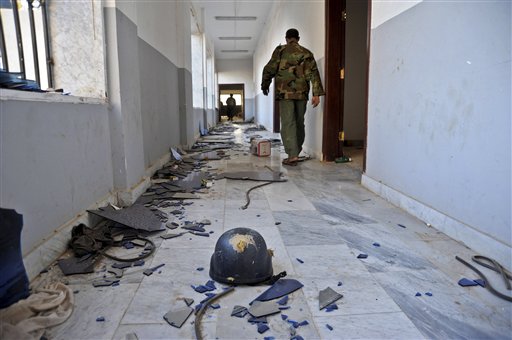Nearly 400 killed in 3 weeks of Libya fighting

In this Monday, Nov. 3, 2014 photo, a Libyan military soldier walks past damages inside a building that was used by Islamic militias for fighting in Benghazi, Libya. AP
TRIPOLI, Libya — Fighting between forces loyal to Libya’s elected government and a loose alliance of Islamist and regional militias has killed nearly 400 people across the country in the past three weeks, a medical official and a militia commander said on Wednesday.
The worst turmoil since longtime dictator Moammar Gadhafi was overthrown by a NATO-backed uprising in 2011 has left the country bitterly divided, with the internationally-recognized government confined to the town of Tobruk in the far east and an Islamist-dominated rival government in the capital Tripoli.
In the mountainous town of Kikla to the south of Tripoli local armed youth supporting the Tripoli militias have been clashing with government-allied forces mainly hailing from the western town of Zintan.
A commander allied to the Tripoli militias said at least 140 people have been killed and more than 300 wounded in the Kikla fighting, which has displaced tens of thousands of residents in recent weeks.
In the eastern city of Benghazi, government-allied forces, including those led by former Gen. Khalifa Hifter, have been battling more radical Islamist militias for control of the city since mid-October. The Islamic militants there include Ansar al-Shariah, which has been blamed for the 2012 attack on the U.S. diplomatic mission that left Ambassador Chris Stevens and three other Americans dead.
Article continues after this advertisementA medical official said the fighting in Benghazi has claimed 252 lives since Oct. 15. Both the official and the militia commander spoke on condition of anonymity because they were not authorized to speak to the press.
Article continues after this advertisementBenghazi, which was the cradle of the Arab Spring-inspired uprising that ended Gadhafi’s four-decade rule, has been paralyzed by the fighting, with schools closed, streets sealed by armed civilians and frequent airstrikes and shelling.
In Tripoli meanwhile, residents awoke to find that a large statue in a central square had disappeared. The culture ministry of the Islamist-backed government said the statue had been stolen, denouncing the act as “an attempt to erase the history, monuments and features of Libya.”
The decades-old statue depicts a naked woman with her back to the sea and her arm around the neck of a deer. Ultraconservative Islamists — who view the depiction of humans or animals as sinful — have tried to vandalize the statue in recent years.
Also on Wednesday, Human Rights Watch said it had found evidence of the use of land mines in the fighting in Tripoli. It said anti-personnel mines were found in the Tripoli airport, which the Islamist-allied Libyan Dawn militia captured from the Zintan militias in August.
The rights group said it was not able to determine which militias used the land mines. It cited reporting by television networks, including Qatar-based Al-Jazeera, which showed footage in September of Libyan Dawn militiamen clearing land mines at the Tripoli international airport, which had been the scene of heavy fighting for weeks.
The rights group said that the mines were looted from Gadhafi’s arsen